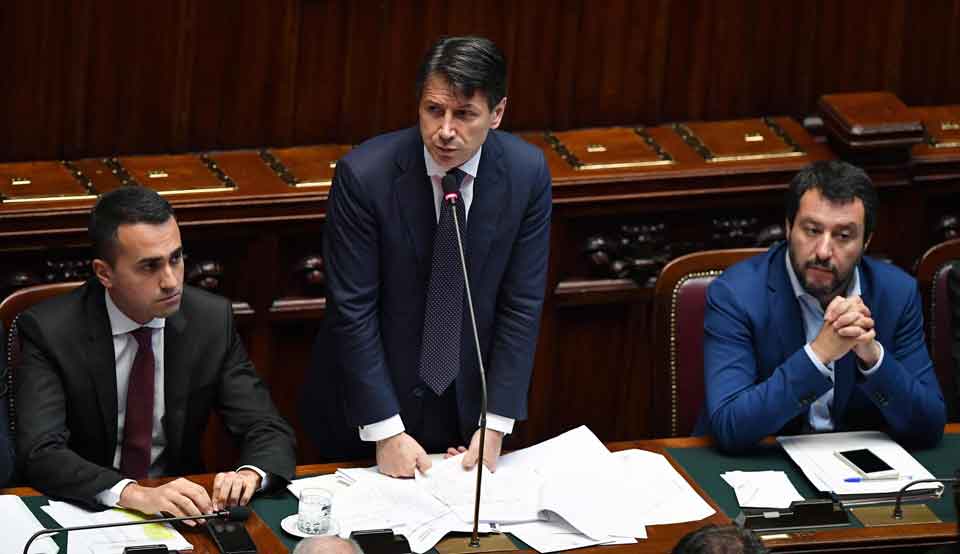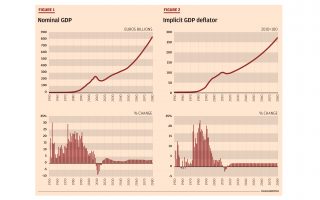Debate: Is Italy going the way of Greece in 2015?

The Italian government elected this summer has a number of similarities with the SYRIZA-Independent Greeks coalition that came into office in Greece in early 2015 and jolted the eurozone with its apparently defiant policy that led to a three-week shutdown of the country’s banks, the imposition of strict capital controls, a divisive referendum and a fresh bailout program worth 86 billion euros. Now it is Rome that appears to be pursuing a quasi-defiant policy toward the eurozone.
Kathimerini English Edition presents the views of Daniel Gros, the director of the Center for European Policy Studies, and Megan Greene, global chief economist at Manulife/John Hancock Asset Management, on the similarities and differences between Greece in 2015 and Italy today.
Daniel Gros: Since June of this year Italy has a new government, which is composed of one right-wing (Lega Nord) party and one left-wing (Five Star movement) party. Both parties can be classified as “populist” in the sense that they put the “will of the people” above European rules and engagements undertaken by previous governments. Moreover, the new government believes that it is morally justified in going against European rules because of the perceived hardship they cause. In this sense Italy today resembles Greece in early 2015.
Megan Greene: There are some similarities between the two countries. Both have faced pressure from the European Commission and the markets as a result of public sector profligacy. Both countries have banks as their Achilles heel. The banks loaded up on domestic sovereign debt in Greece and Italy and so, as yields rose and prices fell, saw their capital ratios dwindle at a time when the government could least afford to bail them out. Both countries also have a growth problem. Greece’s growth was credit-fueled and now the country has rebounded back with growth just over 2 percent after one of the worst depressions the world has seen. Italy didn’t even grow during the boom years, due to structural rigidities in its labor and product markets. Greece and Italy further share a culture of not paying taxes, dragging on government coffers.
DG: But the economic situation is very different. Italy is not a debtor country because, taken as a whole, the nation has almost no foreign debt. Moreover, the country is running a healthy current account surplus, not because imports are artificially repressed, but because exports have been growing strongly over the last years. Domestic savings can easily cover the fiscal deficit. Greece in 2015, by contrast, urgently needed further financing from its official creditors (the European Stability Mechanism and the International Monetary Fund) because its savings had collapsed along with investment and exports were stagnating.
MG: Italy is not Greece – it is bigger and potentially much more problematic. There are significant differences between the two. Whereas Greece suffered from a significant budget deficit and current account deficit, Italy is in current account surplus and so has positive net foreign assets. Italy also has a longer debt maturity profile of nearly seven years and a significant cash buffer so that no one is counting down the days until Italy runs out of money and misses a debt obligation, as was the case with Greece in July 2015. We know a lot more about cross-border exposure to sovereign and bank debt now than we did in 2010 and so there is more transparency about Italy’s debts and obligations. As a result there has been less contagion, as concerns about Italy’s debt sustainability have risen, than there was in the Greek case.
DG: Consequently, given the relative strength in exports and deposits, the Italian government can allow itself the luxury to openly defy Europe, at least in the short run. However a spread of around 300 basis points, over time, will sap the strength of the economy and cripple the banking system. Eventually the Italian government is likely to face the choice of going back on its electoral promises, or exiting the euro. Since the population wants to stay in the euro the choice will be similar to what it was in Greece. But the Italian government will have capitulated to anonymous market forces, not ugly Germans or a troika.
MG: Most importantly, there is no realistic plan for what to do if Italy gets into trouble. A Greek bailout was relatively easy to cobble together because Greece is a small economy. Italy is too big to save, and a bailout plan in the form of Outright Monetary Transactions (OMT) would come with very strict conditions. It is hard to imagine any Italian government accepting the conditions attached to an OMT, least of all the current one.
DG: In conclusion, Italy is in a much stronger fundamental position than Greece. But the Italian government faces essentially the same choice in the long run: if one wants to stay in the euro one has to balance the books.





